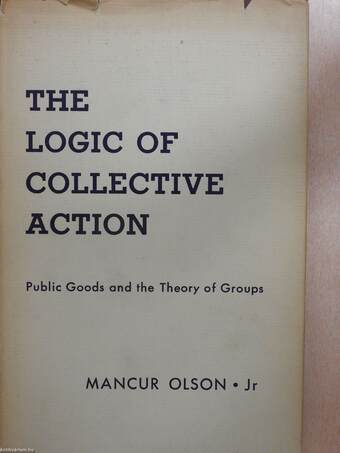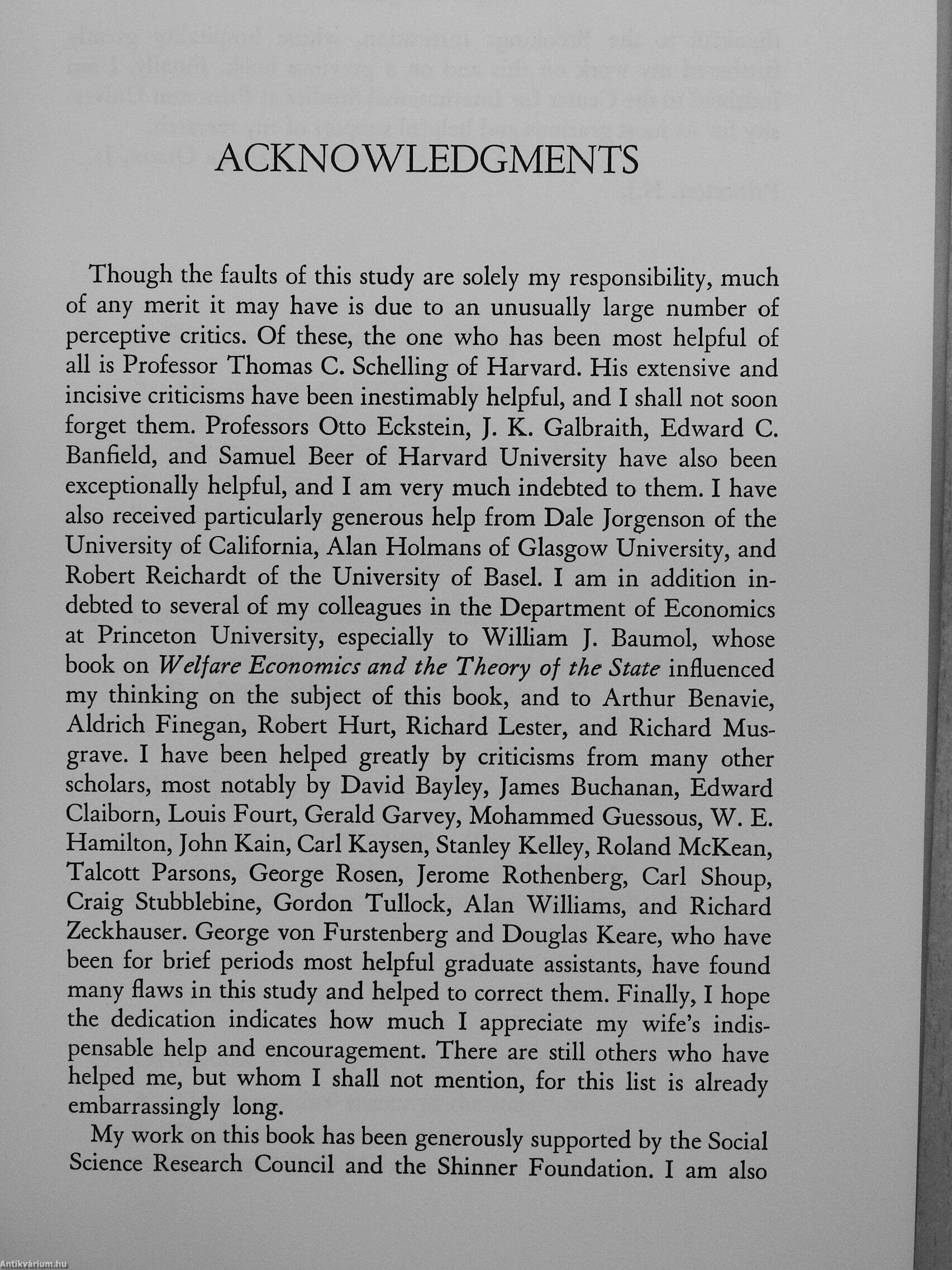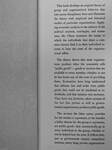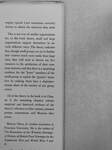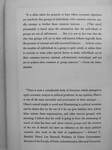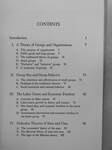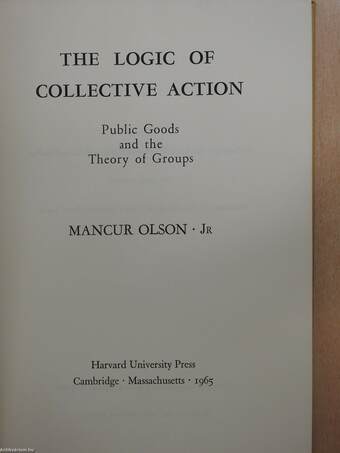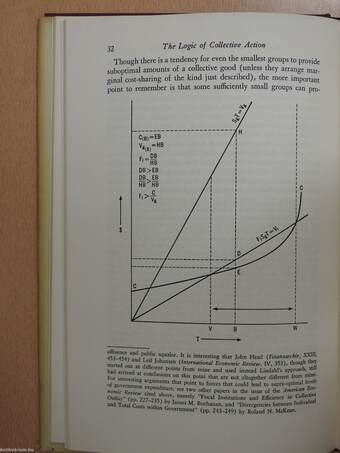1.061.411
kiadvánnyal nyújtjuk Magyarország legnagyobb antikvár könyv-kínálatát

VISSZA
A TETEJÉRE
JAVASLATOKÉszre-
vételek
The logic of collective action (dedikált példány)
Public Goods and the Theory of Groups
| Kiadó: | Harvard University Press |
|---|---|
| Kiadás helye: | Cambridge |
| Kiadás éve: | |
| Kötés típusa: | Vászon |
| Oldalszám: | 176 oldal |
| Sorozatcím: | Harvard Economic Studies |
| Kötetszám: | 124 |
| Nyelv: | Angol |
| Méret: | 21 cm x 14 cm |
| ISBN: | |
| Megjegyzés: | Jr. Mancur Olson szerző által dedikált példány. |
naponta értesítjük a beérkező friss
kiadványokról
naponta értesítjük a beérkező friss
kiadványokról
Előszó
TovábbFülszöveg
This book develops an original theory of group and organizational behavior that cuts across disciplinary lines and illustrates the theory with empirical and historical studies of particular organizations. Applying economic analysis to the subjects oL the political scientist, sociologist, and economist, Mr. Olson examines the extent to which the individuals that share a common interest find it in their individual interest to bear the costs of the organizational effort.The theory shows that most organizations produce what the economist calls "public goods" — goods or services that are available to every member, whether or not he has borne any of the costs of providing them. Economists have long understood that defense, law and order were public goods that could not be marketed to individuals, and that taxation was necessary. They have not, however, taken account of the fact that private as well as governmental organizations produce public goods.
The services the labor union... Tovább
Fülszöveg
This book develops an original theory of group and organizational behavior that cuts across disciplinary lines and illustrates the theory with empirical and historical studies of particular organizations. Applying economic analysis to the subjects oL the political scientist, sociologist, and economist, Mr. Olson examines the extent to which the individuals that share a common interest find it in their individual interest to bear the costs of the organizational effort.The theory shows that most organizations produce what the economist calls "public goods" — goods or services that are available to every member, whether or not he has borne any of the costs of providing them. Economists have long understood that defense, law and order were public goods that could not be marketed to individuals, and that taxation was necessary. They have not, however, taken account of the fact that private as well as governmental organizations produce public goods.
The services the labor union provides for the worker it represents, or the benefits a lobby obtains for the group it represents, are public goods: they automatically go to every individual in the group, whether or not he helped bear the costs. It follows that, just as governments require compulsory taxation, many large private organizations require special (and sometimes coercive) devices to obtain the resources they need.
This is not true of smaller organizations for, as this book shows, small and large organizations support themselves in entirely different ways. The theory indicates that, though small groups can act to further their interest much more easily than large ones, they will tend to devote too few resources to the satisfaction of their common interests, and that there is a surprising tendency for the "lesser" members of the small group to exploit the "greater" members by making them bear a disproportionate share of the burden of any group action.
All of the theory in the book is in Chapter I; the remaining chapters contain empirical and historical evidence of the theory's relevance to labor unions, pressure groups, corporations, and Marxian class action.
Mancur Olson, Jr. teaches economics at Princeton University. He is the author of The Economics of the Wartime Shortage: A History of British Food Shortages in the Napoleonic War and World Wars I and II.
"It is often taken for granted, at least where economic objectives are involved, that groups of individuals with common interests usually attempt to further those common interests . . . [This view] presumably is based upon the assumption that the individuals in groups act out of self-interest . . . But it is not in fact true that the idea that groups will act in their self-interest follows logically from the premise of rational and self-interested behavior Indeed, unless the number of individuals in a group is quite small, or unless there is coercion or some other special device to make individuals act in their common interest, rational, selj-interested individuals will not act to achieve their common or group interests^ — From the Introduction
"There is now a considerable body of literature which attempts to apply economic analysis to political problems. In my opinion, Olson's is one of the most successful and provocative of these attempts . . . Olson's central insight is novel and illuminating to political scientists and he shows that by the use of it he can give familiar facts (about labor unions, farm organizations, and other interest groups) new meaning. I believe that his work is going to force the jettisoning of much of what has been said about interest groups and the revision of the rest. It should also have an influence on the many political scientists who work in the field of organization." — Edward C. Banfield, Henry Lee Shattuck Professor of Urban Government, Member of the Faculty of Public Administration, Harvard University Vissza
Témakörök
- Történelem > Társadalomelmélet
- Szociológia > Politikai szociológia
- Közgazdaságtan > Gazdaságpolitika
- Közgazdaságtan > Közgazdasági elméletek > Egyéb
- Idegennyelv > Idegennyelvű könyvek > Angol > Szociológia > Politikai szociológia
- Idegennyelv > Idegennyelvű könyvek > Angol > Közgazdaságtan > Gazdaságpolitika
- Idegennyelv > Idegennyelvű könyvek > Angol > Történelem > Egyéb
- Idegennyelv > Idegennyelvű könyvek > Angol > Közgazdaságtan > Közgazdasági elméletek > Egyéb
- Történelem > Idegennyelvű > Angol
- Filozófia > Témaköre szerint > Társadalomfilozófia > Egyéb
- Idegennyelv > Idegennyelvű könyvek > Angol > Filozófia > Témaköre szerint > Társadalomfilozófia > Egyéb
- Történelem > Politika > Pártok, szervezetek
- Dedikált, aláírt kiadványok > Filozófia > Szerző által > Dedikált kötetek
- Dedikált, aláírt kiadványok > Idegennyelv > Szerző által > Dedikált kötetek
- Dedikált, aláírt kiadványok > Közgazdaságtan > Szerző által > Dedikált kötetek
- Dedikált, aláírt kiadványok > Szociológia > Szerző által > Dedikált kötetek
- Dedikált, aláírt kiadványok > Történelem > Egyéb > Szerző által > Dedikált kötetek
- Filozófia > Dedikált, aláírt kötetek > Szerző által > Dedikált kötetek
- Idegennyelv > Dedikált, aláírt kötetek > Szerző által > Dedikált kötetek
- Közgazdaságtan > Dedikált, aláírt kötetek > Szerző által > Dedikált kötetek
- Szociológia > Dedikált, aláírt kötetek > Szerző által > Dedikált kötetek
- Történelem > Dedikált, aláírt kötetek > Szerző által > Dedikált kötetek
Jr. Mancur Olson
Jr. Mancur Olson műveinek az Antikvarium.hu-n kapható vagy előjegyezhető listáját itt tekintheti meg: Jr. Mancur Olson könyvek, művekMegvásárolható példányok
Nincs megvásárolható példány
A könyv összes megrendelhető példánya elfogyott. Ha kívánja, előjegyezheti a könyvet, és amint a könyv egy újabb példánya elérhető lesz, értesítjük.



